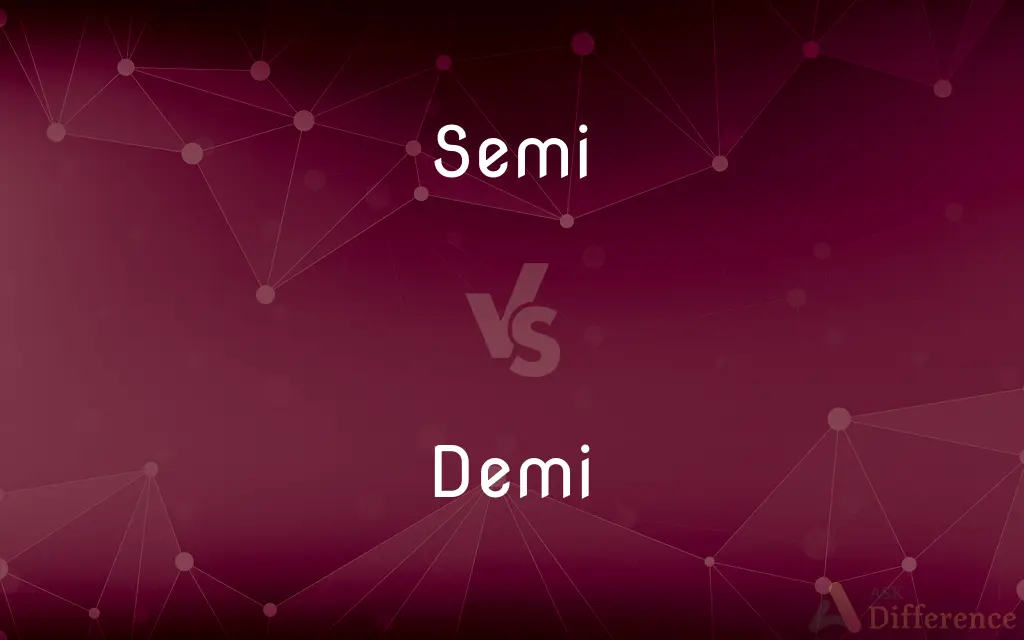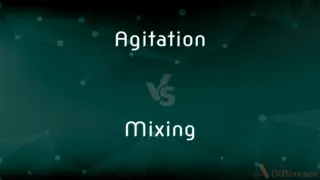Semi vs. Demi — What's the Difference?
By Tayyaba Rehman & Maham Liaqat — Updated on March 21, 2024
"Semi" means half or partially, often indicating something that's incomplete or halfway, while "demi" suggests a smaller or reduced form, often more subtle than semi.

Difference Between Semi and Demi
Table of Contents
ADVERTISEMENT
Key Differences
Semi often implies a halfway point or something that is not fully one thing or another. It's used to denote partial involvement, frequency, or extent in various contexts, such as "semi-annual" meaning twice a year, or "semi-detached" referring to a house that is attached to another on one side. Demi, on the other hand, often conveys a sense of reduction or diminishment but in a more specific or nuanced way, as seen in "demi-god," referring to a being with partial or lesser divine status, or "demi-cup," describing a style of bra that covers half of the breast.
In terms of usage, semi is more commonly used and understood in everyday language and can be applied across a wide range of contexts to indicate something is halfway, partial, or incomplete. Demi, while less common, is often used in more specialized or artistic contexts, such as fashion, to suggest something that is smaller or lesser in degree but not necessarily incomplete.
The prefix semi can be combined with a wide variety of words, often without a hyphen, making it highly versatile in expressing concepts that are halfway, partly, or semi-complete. Demi, however, is often attached to words with a hyphen and used in more specialized terms, indicating a reduction or diminution that is less than full but not necessarily to the halfway point.
Semi carries a connotation of being partway between two states, often implying a division or bifurcation, as in "semi-formal," where attire is between formal and casual. Demi, conversely, carries a connotation of lesser or smaller, often used to denote a special quality or status that is less than full but noteworthy, as in "demi-pointe" in ballet, where the dancer is on their toes but not fully en pointe.
While both prefixes indicate something less than full, semi often suggests a clear division or partiality, whereas demi implies a reduction, often with a sense of nuance or specialty, indicating something that is diminished but retains a significant or distinctive quality.
ADVERTISEMENT
Comparison Chart
Meaning
Half, partially, halfway
Reduced form, smaller, lesser
Usage
Wider application, common in everyday language
More specialized, often in artistic or specific contexts
Combination
Often used without a hyphen, versatile
Usually used with a hyphen, more specific
Connotation
Partial, incomplete, in-between
Reduced, lesser in degree, nuanced
Examples
Semi-automatic, semi-annual, semi-detached
Demi-god, demi-cup, demi-pointe
Compare with Definitions
Semi
Implies something that is not fully one thing or another.
A semi-circle is half of a full circle.
Demi
Suggests a diminution but with a nuance.
A demi-god is a being with lesser divine status, not fully a god nor fully mortal.
Semi
Used across a range of contexts to indicate partiality.
Semi-formal attire is between formal and casual.
Demi
Often used in specific fields like fashion.
A demi-cup bra offers a specific style and coverage.
Semi
Suggests a division or bifurcation into parts.
A semi-detached house is attached to another on one side, but not completely joined.
Demi
Indicates a quality or status that is reduced but significant.
Demi-sec in wine terminology refers to a sweetness that is noticeable but not overly sweet.
Semi
Denotes something occurring at intervals or in stages.
Semi-annual reports are published twice a year.
Demi
Often used to convey a sense of specialty or exclusivity.
Demi-soloist is a ballet rank that suggests a dancer of notable skill, though not the principal.
Semi
Can be combined with many words, often without a hyphen.
Semi-precious stones are less valuable than precious stones but still admired.
Demi
Implies a reduction that retains significance.
Demi-pointe in ballet is a technique that involves a specific foot position.
Semi
A semitrailer.
Demi
Demi is a feminine given name with Greek and Latin roots. It was originally a nickname of Demetria, the feminine form of the masculine name Demetrius, which is itself the Latin and English spelling of the Greek name Demetrios.
Semi
A tractor-trailer.
Demi
Alternative spelling of demy.
Semi
A semifinal.
Demi
(slang) A fifty pence piece.
Semi
A semiformal dance.
Demi
A bottle of wine containing 0.375 liters of fluid, 1/2 the volume of a standard bottle; a split.
Semi
A semi-detached house.
Semi
A semi-trailer; a tractor-trailer; an eighteen-wheeler; an artic.
Semi
(informal) A semifinal.
Semi
(slang) A partial erection of the penis.
Semi
One of the two competitions in the next to the last round of an elimination tournament
Semi
A truck consisting of a tractor and trailer together
Semi
A trailer having wheels only in the rear; the front is supported by the towing vehicle
Common Curiosities
What does "semi" typically imply?
"Semi" typically implies something that is halfway, partially completed, or occurring at regular intervals, like semi-annual.
How does "semi" affect the meaning of a word it's attached to?
"Semi" affects the meaning by indicating that the concept is only partially or halfway applicable, like semi-permanent.
Is "demi" more nuanced than "semi"?
Yes, "demi" tends to be more nuanced, often suggesting a reduction or diminution that is significant in a specialized context, like demi-soloist in ballet.
Can "semi" and "demi" be used interchangeably?
While both indicate something less than full, they are not generally interchangeable due to their nuanced meanings and specific contexts of use.
In what contexts is "demi" commonly used?
"Demi" is commonly used in specialized or artistic contexts, like fashion or ballet, to denote something reduced or lesser in degree but still significant.
How does "demi" convey a sense of specialty?
"Demi" conveys a sense of specialty by indicating a reduced or lesser form that retains a notable quality, like a demi-cup in fashion.
Can "semi" imply regular intervals?
Yes, "semi" can imply occurrences at regular intervals, such as semi-annual or semi-monthly events.
What are examples of "semi" in everyday language?
Examples include semi-detached houses, semi-formal attire, and semi-autonomous vehicles, indicating partial or halfway characteristics.
What does "demi-god" signify?
"Demi-god" signifies a being who is part god and part mortal, indicating a status that is lesser than a god but higher than a mortal.
Is "semi" more common in usage than "demi"?
Yes, "semi" is more common and widely applicable in everyday language, while "demi" is often used in more specific, nuanced contexts.
How do "semi" and "demi" differ in their implications?
"Semi" often implies a clear division or partiality, whereas "demi" implies a reduction with a sense of nuance or specialty.
Share Your Discovery

Previous Comparison
Perfusion vs. Diffusion
Next Comparison
Agitation vs. MixingAuthor Spotlight
Written by
Tayyaba RehmanTayyaba Rehman is a distinguished writer, currently serving as a primary contributor to askdifference.com. As a researcher in semantics and etymology, Tayyaba's passion for the complexity of languages and their distinctions has found a perfect home on the platform. Tayyaba delves into the intricacies of language, distinguishing between commonly confused words and phrases, thereby providing clarity for readers worldwide.
Co-written by
Maham Liaqat















































